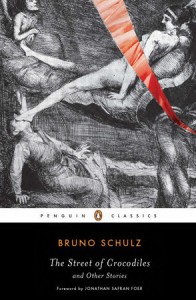 In 1942, after German troops invaded the Polish town of Drohobycz, a middle-aged Jewish man, a teacher and amateur painter who had survived the occupation by exchanging his skills as a muralist for protection from a local Gestapo officer, was walking home from the “Aryan” quarter, loaf of bread in hand, when a man he had never met, yet another Nazi officer, shot and killed him. On the seismograph of senseless brutality committed during World War II, a solitary murder barely registers, except that the victim, in this case, was Bruno Schulz, a writer of imaginative talent to rival Kafka. Two volumes of short stories – The Street of Crocodiles and Sanatorium Under The Sign Of The House Glass – and a handful of uncollected stories are all that remain of his creative work; a novel, The Messiah, allegedly sent to Thomas Mann for review, is lost to time. These are all collected in this Penguin Classics edition, together with the sketches and drawings that often accompanied his writing.
In 1942, after German troops invaded the Polish town of Drohobycz, a middle-aged Jewish man, a teacher and amateur painter who had survived the occupation by exchanging his skills as a muralist for protection from a local Gestapo officer, was walking home from the “Aryan” quarter, loaf of bread in hand, when a man he had never met, yet another Nazi officer, shot and killed him. On the seismograph of senseless brutality committed during World War II, a solitary murder barely registers, except that the victim, in this case, was Bruno Schulz, a writer of imaginative talent to rival Kafka. Two volumes of short stories – The Street of Crocodiles and Sanatorium Under The Sign Of The House Glass – and a handful of uncollected stories are all that remain of his creative work; a novel, The Messiah, allegedly sent to Thomas Mann for review, is lost to time. These are all collected in this Penguin Classics edition, together with the sketches and drawings that often accompanied his writing.
The stories themselves have the quality of dreams, not only in their tendency to mock the possible and the probable alike, but in the transformative potential of their language. Schulz’s narrator is a young boy, the son of a merchant father living in a fictionalized town not unlike Schulz’s Drohobycz, and his innocence and sense of wonder at the world he does not yet comprehend gives Schulz maximum creative freedom. “Poetry,” Schulz writes in one of his essays, “happens when short-circuits of Sense appear between words, a sudden regeneration of the primeval myths,” and that short-circuiting of sense is precisely the mechanism by which he forces us to see even the quotidian with fresh eyes, fresh insights. All of us, at one point in our lives, when the world lay before us unexplored and unnamed, were capable of this kind of poetic insight. In a different story, Schulz calls this “the age of genius,” the “phenomenon of imagination and vicarious being,” when “an event may be small and insignificant in its origins and yet, when drawn close to one’s eye, it may open in its center an infinite and radiant perspective because a higher order of being is trying to express itself in it and irradiates it violently.” Metaphor, good metaphor, is inherently regenerative, because it forces words and their referents into strange and unfamiliar combinations, forcing us to consider both anew. In Schulz, as in Kafka, these metaphors can operate at the level of the lone sentence or the entire narrative, but they cannot be justly described without quotation. Here, for example, is the narrator’s experience of exchanging a darkened building for the brightness of day:
The passersby, bathed in melting gold, had their eyes half-closed against the glare, as if they were drenched with honey. Upper lips were drawn back, exposing the teeth. Everyone in this golden day wore that grimace of heat – as if the sun had forced his worshippers to wear identical masks of gold. The old and the young, women and children, greeted each other with these masks, painted on their faces with thick gold paint; they smiled at each other’s pagan faces – the barbaric smiles of Bacchus.
In another example, a sleeping young woman is described as being “white as a wafer and motionless like a glove from which a hand had been withdrawn. And, as if taking advantage of her sleep, the silence talked, the yellow, bright, evil silence delivered its monologue, argued, and loudly spoke its vulgar maniacal soliloquy.” Both examples turn on a shift in perspective, from what is being described – and what any onlooker would notice (ie. people blinded by the sun, or a woman fast asleep) – to a personification of a third party, who is imagined to be playing some part in the scene. Thus the sun is a demanding god, forcing his onlookers to wear golden masks, and the sinister silence of night paradoxically delivers a soliloquy, transforming the sleeping woman into its mute audience.
Schulz is a difficult writer, if only because he renders his stories almost entirely through the lens of metaphor. Complex family relationships – father-son, husband-wife – and a dramatic struggle for power between man and woman, masculine and feminine, are explored in the most allegorical of terms. But attend to the language, tease out the implications of his many metaphors, and you will discover a writer as exquisitely imaginative and as devastatingly original as Kafka.